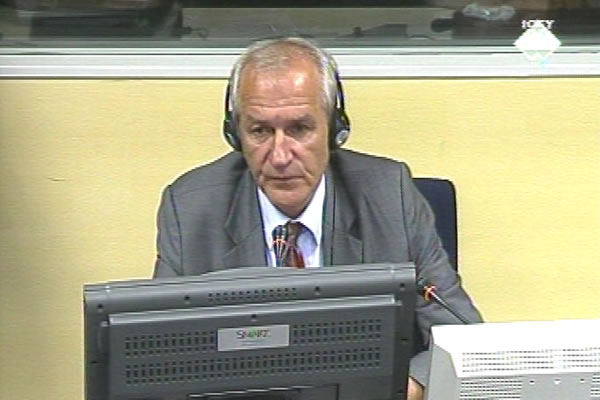Home
NO POINTS FOR PRESENTATION
According to former commander of the Igman Brigade Velimir Dunjic, the VRS documents were ‘too general’ in their assessment of the crimes against the non-Serbs in the Sarajevo area. Dunjic compared those assessments with points awarded for ‘presentation’ in figure skating. In Dunjic’s view, there is nothing controversial about a unit run by the Chetnik warlord Brne being described as a ‘criminal group’ whose actions were detrimental to the Bosnian Serb Army. Brne’s unit operated as part of Dunjic’s brigade
 Velimir Dunjic, defence witness at Rako Mladic trial
Velimir Dunjic, defence witness at Rako Mladic trial After a protected witness testified yesterday in closed session, today Ratko Mladic’s defense called the former commander of the Igman Brigade Velimir Dunjic. He was appointed to that post in August 1992 and remained in command until he was removed in January 1993. Contrary to the allegations in the indictment about the terror campaign against the Sarajevo citizens, in his statement to the defense Dunjic said that his unit never used artillery to attack civilians. There were no snipers in his unit, Dunjic claimed.
In a brief examination-in-chief Dunjic said he was surprised by the ‘platitude’ about the VRS holding ‘dominant positions’ and ‘shelling Sarajevo from the hills’. According to Dunjic, the Sarajevo-Romanija Corps was ‘tactically in a worse position’ than the enemy. The BH Army ‘copied the practice from the Second World War’: it fired on the Serb positions during religious holidays such as St. Nicholas day, Christmas and the Orthodox New Year, Dunjic explained.
In his statement, the witness didn’t mention the crimes Mladic is charged with. Dunjic did say that a unit run by the Chetnik warlord Branislav Gavrilovic Brne acted as part of his unit, but he noted that in 1992 Brne’s unit didn’t commit any crimes. Although Dunjic mentioned Brne in a single paragraph in the statement, prosecutor Jeremy dedicated most of the cross-examination to the issue.
He showed the witness the minutes from a meeting held on 15 November 1992, when the Corps security officer warned others who were at the meeting, including the witness and the accused, about ‘widespread’ thefts, robberies, looting and the ‘regular and unnecessary abuse and killing of people from other ethnic groups, in particular Muslims’. Members of ‘informal groups’ were responsible for that, the security officer said. The prosecutor asked the witness whether these included Brne’s unit, which was subordinate to Dunjic. ‘That is not correct, show me proof that they committed a single crime during the time I was the commander’, Dunjic countered.
According to prosecutor, the proof lies in a report written by the Corps commander Stanislav Galic on 18 November 1992. In the report Brne’s unit was described as a ‘group of criminals whose actions damage the VRS reputation’. As Dunjic said, it was a ‘random and generalized assessment’ akin to the points awarded for ‘presentation in figure skating’. In Dunjic’s opinion, Galic’s description wasn’t controversial at all. Dunjic could not see why describing Brne’s unit as ‘a group of criminals’ necessarily means that they committed any crimes. Their ‘improper behavior’ might have comprised minor misdemeanors such as fighting in bars, or refusing to cede their seat to an old woman in a bus, not to actual crimes.
Dunjic was removed from the post of the brigade commander after a clash with General Galic on 14 January 1993. The police report about the incident states that Galic and his security detail arrived at Dunjic’s place where he was with Brne’s men. Alcohol was consumed during the discussion. At the point ‘when everybody was already drunk’, Dunjic jumped on Galic, ‘tore off the general’s insignia from his uniform and poured sauce over him’. The witness denied that he had consumed alcohol, and that Brne’s men were there as his bodyguards. He did not deny however that he had torn off Galic’s insignia because Galic purportedly ordered his men to shoot Dunjic.
In his evidence in Radovan Karadzic’s defense, General Galic stated that Dunjic was removed from his duty because he had arrested members of the Bosnian Serb Army on his own authority, and because of ‘disproportionate use of artillery’ in the attacks on Sarajevo. According to the witness, he shelled only the enemy positions and in fact didn’t know what disproportionate use of artillery would comprise. General Galic was sentenced to life for the terror campaign against the citizens of Sarajevo.
At the end of his testimony, Dunjic thanked the Trial Chamber for allowing him to testify as a defense witness of ‘the great Serb hero Ratko Mladic’. This prompted presiding judge Orie to say that ‘no propaganda is allowed in the courtroom’. The witness’s words have been recorded and will be taken into consideration when his testimony is assessed, the presiding judge stressed.
Linked Reports
- Case : Mladic
- 2014-08-27 PROSECUTION CALLS FOR OPPORTUNITY TO PRESENT TOMASICA EVIDENCE
- 2014-08-26 DOCUMENTS FULL OF ‘ERRORS’
- 2014-08-25 MLADIC’S DEFENSE: WE DON’T WASTE COURT TIME
- 2014-09-01 EVIDENCE ON DEPLYOMENT OF BH ARMY TROOPS IN SARAJEVO
- 2014-09-02 PROBATIVE VALUE OF DEFENSE EVIDENCE – ‘ZERO’
- 2014-09-04 BOSNIAN SERB ‘NEW DEMOGRAPHIC POLICY’
